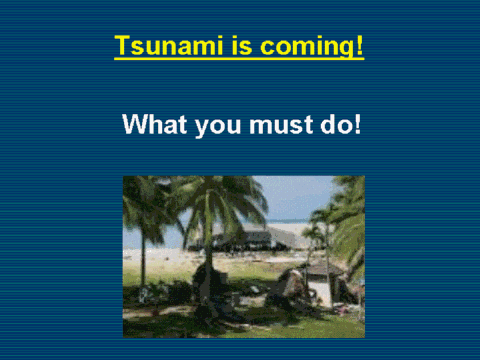| front |1 |2 |3 |4 |5 |6 |7 |8 |9 |10 |11 |12 |13 |14 |15 |16 |17 |18 |19 |20 |21 |22 |23 |24 |25 |26 | 27|28 |29 |30 |31 |32 |33 |34 |35 |36 |37 ||38 |39 |40 |41 |42 |43 |44 |45 |46 |47 |48 |review |
 |
A strong earthquake
felt in a low-lying coastal area is a natural warning of possible, immediate
danger. Keep calm and quickly move to higher ground away from the coast.
When you hear that an earthquake has occurred in the ocean or coastline regions, prepare for a tsunami emergency. All large earthquakes do not cause tsunamis, but many do. If the quake is located near or directly under the ocean, the probability of a tsunami increases. Tsunamis can occur at any time, day or night. They can travel up rivers and streams that lead to the ocean. A tsunami is not a single wave, but a series of waves. Stay out of danger until an "ALL CLEAR" is issued by a competent authority. Approaching tsunamis are sometimes heralded by noticeable rise or fall of coastal waters. This is nature's tsunami warning and should be heeded. Approaching large tsunamis are usually accompanied by a loud roar that sounds like a train or aircraft. If a tsunami arrives at night when you can not see the ocean, this is also nature's tsunami warning and should be heeded. A small tsunami at one beach can be a giant a few miles away. Do not let modest size of one make you lose respect for all. Sooner or later, tsunamis visit every coastline in the Pacific. All tsunamis, like hurricanes, are potentially dangerous even though they may not damage every coastline they strike. Never go down to the beach to watch for a tsunami! WHEN YOU CAN SEE THE WAVE YOU ARE TOO CLOSE TO ESCAPE. Tsunamis can move faster than a person can run! During a tsunami emergency, your local emergency management office, police, fire and other emergency organizations will try to save your life. Give them your fullest cooperation. Homes and other buildings located in low lying coastal areas are not safe. Do NOT stay in such buildings if there is a tsunami warning. The upper floors of high, multi-story, reinforced concrete hotels can provide refuge if there is no time to quickly move inland or to higher ground. Stay tuned to your local radio, marine radio, NOAA Weather Radio, or television stations during a tsunami emergency - bulletins issued through your local emergency management office and National Weather Service offices can save your life. Citation source: http://wcatwc.arh.noaa.gov/safety.htm |